Low-Income and Poverty
Communities and countries worldwide face the harsh realities of low incomes due to low employment, tough economies, and unsteady world markets. It becomes a struggle to provide themselves and their families with basic needs like food and a sense of community in an unforgiving world. People affected by these factors range in numbers, race, and language, proving that hunger is a universal enemy.
Low-income is a term used to describe a person or family that makes less than the provincial or federal cut-off dependent upon the region. For example, in 2010, if a single person made under $23, 298 before tax with a 1992 base (using the purchasing power of a dollar from 1992), they would be eligible for various tax breaks and benefits. However, these tax breaks do not always provide what is needed for each person, leaving many people not able to afford food after spending their money on things like housing, electricity, and transportation.
If we take Canada alone, 13.8 percent of people nation-wide were considered low-income in 2012. While rates have been shown to be shrinking since 2010, where it was at 14.9, the numbers still prove that there are almost 5 million Canadians who go to work, school, or bed with an empty stomach.
As an example, currently Notre-Dame-de-Grâce (NDG) has 25% of its residents living below the poverty line, while 26% of families living on less than $20000 per year. The borough is in need of help to curb this unfortunate hindrance.
Thankfully, there are organizations that help these struggling communities. The Montreal suburb of NDG has the perfect example of one such organization; the NDG Food Depot.
The NDG Food Depot
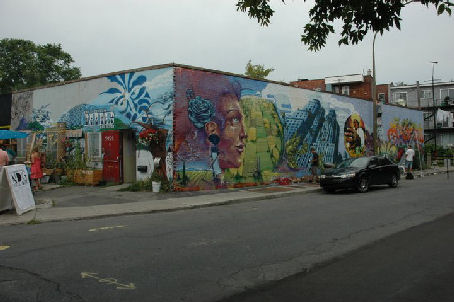 The NDG Food Depot is a non-profit organization that has been around since 1986, providing fresh, healthy foods to those struggling in the community. They are making a difference in the community with their fight against hunger, something that other struggling communities can learn about.
The NDG Food Depot is a non-profit organization that has been around since 1986, providing fresh, healthy foods to those struggling in the community. They are making a difference in the community with their fight against hunger, something that other struggling communities can learn about.
The NDG Food Depot began in 1986 with the direction to help those in desperate need of food. It used to be through the church, but there was a recession in the 1980's and churches could not keep up with the demand. Concerned citizens, small organizations, NDG community council started the program out of the St. Augustine church. It eventually leased property on Oxford for many years, until the owners sold the property, forcing the NDG Food Depot to move.
"We were leasing a space and the owners decided to sell it. We had very little notice," says Bonnie. "We had one weeks' notice; we thought we had 3 months. The cheques were already made. It was literally like 'you are out on the street.'" The building was sold and demolished. Now it's just a big hole in the ground.
Currently, Trinity Church is their home, but they need to move due to the church moving to a smaller church. They need a place large enough to be able to keep all of their initiatives running, as well as proper storage for food. "We are looking at 4 places, one owned by the school board, one by the city," says Bonnie.
It may have taken up various residents over time, starting in church basements, moving to Oxford Street, and currently looking for a new home, it always provided those in need with food. Since 2003, they have become an independent volunteer organization, creating and implementing a variety of programs, like the Good Food Box, that accept donations and work with local grocers to acquire food for the community that needs it.
"We are going to start new markets for produce in the future. We are trying to start new initiatives," says Bonnie. More classes like Urban Gardening and cooking are also being taught to those who wish to learn how to grow their own food and cook different dishes.
Donations and Service
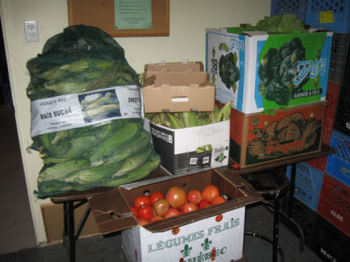 "One of the main ways The Food Depot gets a major chunk of the staples is the NDG Food Depot Annual Holiday Food Drive," says Shannon Millichamp, a former intern employee and volunteer. "The food is donated by people all around the community and collected by volunteers at different points." The food is then verified, as opened or expired food and alcohol are not permitted, transported, sorted, and stored at the Food Depot.
"One of the main ways The Food Depot gets a major chunk of the staples is the NDG Food Depot Annual Holiday Food Drive," says Shannon Millichamp, a former intern employee and volunteer. "The food is donated by people all around the community and collected by volunteers at different points." The food is then verified, as opened or expired food and alcohol are not permitted, transported, sorted, and stored at the Food Depot.
The NDG Food Depot has two service days per week, where people in need can pick up the staples, such as canned goods like tuna, beans, and tomatoes, pastas and sauces, rice, powdered milk, cereals, and more. These are all free of charge, given to those within a specific area and if they qualify as low-income. However, each individual or family can only obtain this package once per month.
The Food Depot provides 600-800 food baskets per week throughout NDG and parts of neighbouring boroughs like Westmount and Lasalle. By doing simple math and remembering that each of these baskets are served to one family or person per month, this means that at least 2400 people per month need these boxes to help them survive. And this is only in one specific part of Montreal.
"We are unique because we can do home deliveries for those who can't make it to us. We stay open until 7 on Mondays to help people who can't make it during the day who are going to school or have work," says Bonnie. The organization realizes how hard it is for some residents to visit them, so they try to accommodate as many as possible.
The NDG Food Depot also serves up to 300 free community meals per week through their Boomer Cafe. These meals are made by volunteers and are for anyone who wants a fresh, hot meal made from the same donated food found in the food baskets. The recipes for various meals can also be obtained for anyone who wants to learn how to make any meal previously prepared.
The Good Food Box
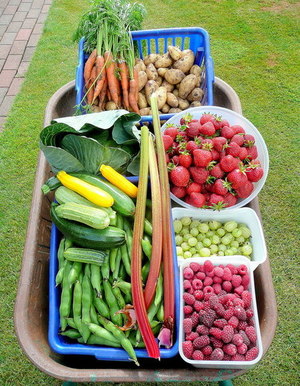 The Good Food Box is a program initiated and implemented through the NDG Food Depot to work with the farmers of Quebec in making fresh fruits and vegetables more available. The produce is sold to the general public, so anyone and everyone can get great value for their dollar.
The Good Food Box is a program initiated and implemented through the NDG Food Depot to work with the farmers of Quebec in making fresh fruits and vegetables more available. The produce is sold to the general public, so anyone and everyone can get great value for their dollar.
Currently, in the $17 box, you can get 8 kiwis, 8 oranges, 8 pears, 2 mangos, 1 head of lettuce, 1 bunch of scallions, 3 onions, 10 potatoes, 8 tomatoes, 1 bag of carrots, 1 bunch of radishes, and 1 bunch of spinach. No one needs any explanation as to what a great deal that is.
More and more people are beginning to realize what a great deal it is, too. In 2007, there were 3600 boxes of fresh produce sold to the public. That number grew astronomically, growing to 22800 boxes sold in 2010 and 31000 boxes in 2011. People all around have been enjoying the savings; with the same money, one would only be able to buy up to half of what is in each box at their local grocer.
Volunteers and Funding
With all the NDG Food Depot's staff and volunteers - around 60-70 volunteers per week and most of which are from the community it helps - it still has its own struggles. There is an increase in the amount of families in need, periodic low volunteer rates, and a current loss of housing, due to the land it resided on being sold for condo construction.
"Our budget keeps going up and up" says Bonnie Soutar , Director of Development at the NDG Food Depot. "The food budget for the year is roughly $500000," but Bonnie fears she may have a deficit this year. Funding comes from all different places; private institutions (schools, private organizations, members), foundation donations, and grants account for nearly half of their budget. Centraide helps out too; "they provide core funding to help with big things," says Bonnie.
"Budgets are decreasing because governmental funding is down heavily," says Bonnie. Even with dwindling government support, she believes that the Food Depot can support itself through its own initiatives and private funding.
With regards to government help, there is only a little. The NDG Food Depot receives a municipality grant of only $20000 and provincial funding at around $18000-20000. Federal funding through summer jobs but did not always work out, but this year they received three First Nations employees, paid by the federal government for support.
"Fundraisers make about 20% of our budget, third party fundraising made about 10% this year. CBC Montreal made about $30000 through fundraising," says Bonnie.
A Centre for All
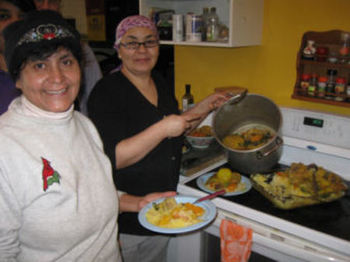 "A Community Food Centre exists to innovate grassroots-level programs that are based on a view of food as having profound social, cultural, and material significance, and which operate either partly or wholly outside the market" writes Kathryn Scharf, Charles Levkoe, and Nick Saul in a paper outlining the importance of community centres and food. They have been working with organizations similar to the NDG Food Depot in Ontario.
"A Community Food Centre exists to innovate grassroots-level programs that are based on a view of food as having profound social, cultural, and material significance, and which operate either partly or wholly outside the market" writes Kathryn Scharf, Charles Levkoe, and Nick Saul in a paper outlining the importance of community centres and food. They have been working with organizations similar to the NDG Food Depot in Ontario.
The NDG Food Depot accepts volunteers from all over, as well as members. People can become members by filling out a form found on the NDG Food Depot website. Each member falls into a variety of categories; either they can volunteer their time or donate their money.
Here is the link to the NDG Food Depot, as well as the sources of information and photos in this article. All credit for photos goes to the NDG Food Depot, with special thanks to Shannon Millichamp and Bonnie Soutar:
- The NDG Food Depot: http://depotndg.org/en/index.html
- Kathryn Scharf, Charles Levkoe, and Nick Saul: http://depotndg.org/pdf/in_every_community_a_place_for_food.pdf
- NDG Food Depot Annual Food Drive: http://mtltimes.ca/montreal/ndg-food-depot-holding-annual-holiday-food-drive/
- Tavia Grant: http://www.theglobeandmail.com/report-on-business/economy/nearly-5-million-canadians-in-low-income-status-2012-research-shows/article22020841/
Statistics in this article were found on the Statistics Canada website:
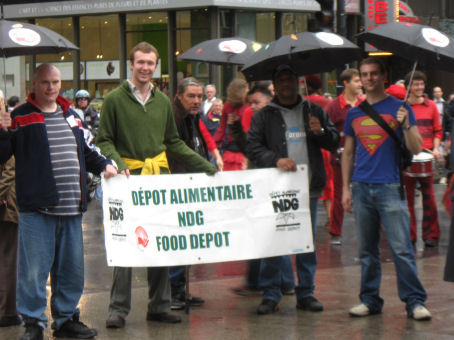
A great cause and wonderful idea to end with referrals and redirects. Good work.